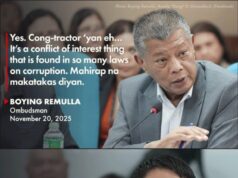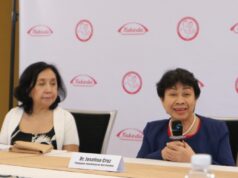
CITY OF SAN FERNANDO – The Department of Environment and Natural
Resources in Central Luzon has renewed its call to the public to do their part in
the proper disposal and segregation of wastes.
DENR assistant regional director for management services Laudemir Salac said
that with the accumulation of used face masks and other personal protective
equipment which are mostly non-biodegradable during the pandemic, there is
really a need to segregate trash.
“Data from the Environmental Management Bureau shows that in the previous
year, daily wastes generated nationwide reached about 5.59 million kilos. Of
these mixed wastes, about 3.91 million kilos composed of both biodegradable and
non-biodegradables; 1.39 million kilos are being disposed; while 279,920 kilos are
residual wastes which should be disposed in sanitary landfill areas,” he said.
With this amount of garbage generated daily, Salac stressed the negative impact
it can cause to the environment if these wastes were not properly disposed and
segregated.
One of these, he said, is water pollution, which can result if wastes will be
dumped in creeks and estuaries and go down to the major river systems like
Manila Bay, and ultimately down to the coastal areas.
When this happens, Salac said, marine resources will be contaminated and may
die. In addition, this can also increase the risk of flooding if drainages get clogged
with garbage.
“There is also air pollution in cases of open dumpsite, where wastes just piled up
and not segregated. In the process of decomposition of unmanaged waste, it
produces methane gas which is one of the greenhouse gases that affects the
ozone layer and contributes to global warming. Also, during this process, carbon
dioxide is produced which can also contribute to a rise in atmospheric
temperature,” he said.
With these negative impacts to the environment, Salac urged the public to start
proper waste management and disposal at home.
He said people should be reminded of proper segregation, and the need to
intensify recycling.
“We should avoid single-use plastics. We don't want bottled mineral water
anymore. We advocate the use of tumblers. We need to beef up our recycling
program in the Philippines since it is not yet very efficient. We keep on producing
these PET bottles and this one-time use plastics like straws in fast foods that will just accumulate after use. However, we should start using alternatives to those,”
he said.
Salac cited the need to reduce, reuse, and recycle by transforming one product
into another useful product; and refusing to use Styrofoams, and instead opt for
biodegradable containers like those made of starch.
DENR also urged municipal government to establish their own materials recovery
facility and create compost pit for fertilizers.
Salac assured that DENR will continue to strengthen public awareness through
conduct of dialogues with barangay officials and their counterparts in the local
government units to provide technical assistance and monitor their compliance to
ecological solid waste management.
“We will also continue with our information, education, and communication
program to involve the community to further develop their behavior towards
proper waste management,” he said. – PIA-3




